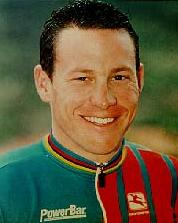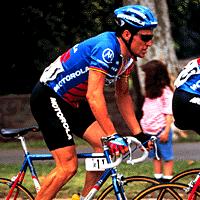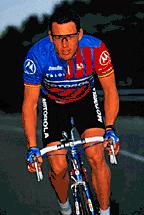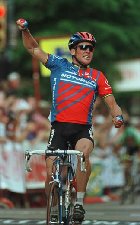Heralded as the heir apparent to the great Greg Lemond, Lance Armstrong stunned the bicycling and sports world with his revelation in Oct 1996 that he had Testicular Cancer..... Of course, we now know that Lance came back to beat his cancer and win the Tour de France in 1999, 2000 and 2001! This interview was done only a few short months after he finished his chemotherapy and the future was far less certain...
|
Click Here for Up to Date Links! Archived Info:
|
Chris Brewer, Feb 7, 1997

I met world class cyclist Lance Armstrong at his home in Austin on a bright Texas day...like me, he had recently finished up his surgical and chemo treatments and it appeared that we were having a hair growing race--he was slightly winning! He appeared in fine health and spirits and was very down to earth to talk to. Over lunch we discussed his Testicular Cancer (TC) experience and subsequent treatments, as well as his newly created cancer foundation and upcoming charity bike ride "The Race for the Roses" March 23d, 1997
 TCRC - You've said that you knew something was wrong 3 years before you got diagnosed with TC--why did you wait so long?
TCRC - You've said that you knew something was wrong 3 years before you got diagnosed with TC--why did you wait so long?
I always had the size difference there, but I didn't know...I would've still been waiting if it hadn't started hurting, it just got so painful I couldn't sit on my bike any more.
Did you think it was bike related?
I didn't know, I had no idea...maybe bike related, maybe I hit it somehow, maybe sex related! But I said "This is ridiculous," and the pain just wouldn't go away.
Weren't you actually coughing up blood?
That was a one time deal, but that was before the pain really started...I guess I was pretty hard headed. I mean, I was an athlete, I would always have little aches and pains, little colds, little problems that would come and go...so I thought if I coughed up a little blood and if I don't do it tomorrow, then it must not have been any big deal!
Could you describe how you finally decided to go in and get checked, what your diagnosis experience was like, and the thoughts you had as it set in?
That was here in Austin...I thought I had a torsion thing or epididymitis, or some sort of infection thing, and (my doctor) thought that at first. And just to be safe, he sent me over to have it ultrasounded to make sure there's not a tumor there...so then I automatically said, OK, I'd better be prepared for the bad news because there's a small chance (that it could be cancer). So then the ultrasound tech was doing it...and I knew there was a problem, and then she said she'd better go and get the Radiologist...I was like, "Wait a minute,"...so then he looks--and they won't say anything to you--so I cornered the guy and said "What the hell is going on?!" And he told me that he didn't want to take the wind out of my doctor's sails, but this could be a tumor. I said "This is a joke," and then they said they needed to do a chest X-ray, and I said "Wait a minute here, I don't have any chest pain--why do you want to look at my chest?!" Then I was convinced, and they said you need to go right back to the doctor, right now...and he said "Lance we've got some problems".
Did you have any idea that you were as serious a case as it turned out to be?
No idea...I just thought that...well I thought: "Oh my God I'm gonna die!" and I didn't even know how bad it was...then my neighbor who is a urologist came over and told me that this cancer had a really high cure rate and yada-yada-ya...but I still didn't know it was that bad in my lungs...I didn't know anything about AFP levels, HCG levels (blood tests) or anything about what was in my brain...I didn't know anything, and I still was scared! Had I known all that I probably would've been petrified...it kind of worked out better that I got the bad news gradually...it would've been really rough for them to have said you've got cancer here, here, here and here, your levels are off the board, and your chances are less than 50%...I would've had a really hard time handling that.
But at the same time it was also bad because it was a 3 to 4 week process of every week something else coming up...I did my first cycle (of chemo) here locally...in the interim we said let's send the protocol out to MD Anderson and Indiana University to make sure they're doing the right thing, and the MD Anderson people got the ball rolling with the brain scan--and spots were there.
Is it a natural progression in your case to do the brain scan?
They say any time you have a lung mass, you should do a brain scan, because it's the next place they go. It's just like if you have mets (spreading) to the abdomen, the next place they check is your lungs...and if there was something on top of your brain, I guess they'd check that too!
What treatment options were available to you? or was it pretty straight forward, "This is what you have to do"?
The only "debate" was chemo 3 or 4 cycles, and they said "You're so advanced you need 4 cycles."
Why didn't you have the RPLND (abdominal) surgery?
Because I didn't have much in my abdomen. It was very small...most of my disease was in my lungs.
 Do you remember what your diagnosis was?
Do you remember what your diagnosis was?
60% choriocarcinoma, 40% embryonal, and less than 1% teratoma. The funny thing is that Dr. Nichols (at IU) said from Day One that if I had walked in with my symptoms, they would've started chemo like THAT, and wouldn't even have taken (the testicle) out...it seems like the make up of mine is very sensitive to chemo, the teratoma is not, but I didn't have very much of that...but then again, they wouldn't have known that if they hadn't taken out the testicle! So anyway, it was mostly chorio, which is bad...
What were the treatments you had?
One 3 week cycle of BEP here in Austin...outpatient...then I went to MD Anderson and then to Indiana University...I had the brain operation there the Thursday prior to my next chemo cycle and then started that the following Monday with 3 more cycles of VIP. The last VIP (chemos) were inpatient...cycles 3 and 4 I was sick as a dog, but I didn't lose any weight. One thing I don't understand--you're in this place where they're trying to make people better, trying to heal people--and they serve this food, it has to kill people! (laughs)
I remember one meal of cafeteria jambalaya and Brussels sprouts...
My old coach used to drive down from Milwaukee and stay with me at IU, and he'd go out and get us food...but I'd eat their apple fritters, though--I could eat them all day! You find things you can eat, and some things that you hate that make you sick as a dog, then certain little things you have these infatuations with and you can eat them all day long...those apple fritters...
Tell me about the brain operation...
They (IU) do a pretty good job of making you comfortable....the lesions are small, they're easy to get to, and I thought well, that's great, it could be worse, they could be big and inoperable. They were saying this was a relatively "minor" brain operation and they do this every day, I'm not gonna have a lot of pain, your risks aren't too great...but then as time got closer and closer to the operation I'm saying "You guys said this is pretty minor, right?" and they started saying "Weeelll, there's really no such thing as a minor brain operation" I was like "Well, wait a minute! You said it was minor!", but they were wonderful (the staff at IU).
Can you describe the actual operation? What'd they do, take a piece out?
They pull it off, they cut a hole, see? (Lance bowed his head to show 2 circular scars, 1 at the top, the other in the center/back of his head, both approximately the size of silver dollars.) They pull the bone off much like you would the top off a pumpkin, then they pull back the protective layer and the tumor's there...they locate it through "frameless stereo-tactics", they put these nodes all over my forehead then they have a wand and touch each electrode that will produce an image of your brain on this video screen, and then they know exactly where it is...that takes the longest time, trying to locate it.
Then they drill these things into your head to steady it...you're unconscious the whole time, about 5 or 6 hours--it was not fun, I was really scared. A part of me thought I wasn't coming back...when they rolled me in there I thought "This is it". When the technician came in and started asking me questions like "Are you aware of the risks?" and "Do you approve a blood transfusion if we need to?", I said "Yeah, why?", and he said "Well, there's a risk of AIDS", and I'm like "Wait a minute! Let's get it over with--whatever you have to do, just get me out of here!".
Did you use any alternative treatments?
Vitamins...I always took vitamins, I just continued taking them.
What were some of your initial thoughts about TC?
It's like breast cancer--women don't really want to talk about it...men don't really want to talk about it...at first I didn't understand...it's like, man, what's the big deal? But now that I have been through it and I see people's reactions, and I read the Internet--like cycle pages--and people say some stupid things, there's some stupid people out there, they think it's funny some times! So now I can understand why some people might be self conscious...it's still a rare cancer like compared to breast cancer...
They say it's about 1% of all cancers...but I am amazed since my diagnosis at the amount of people I have met that have either had TC or know someone who has... You were in pretty serious trouble for a while--did you ever think "Man, I could be dying!".
I never felt like I was dying...I still could die, and that's the scary thing...I'm not out of the woods at all, I'm only 6 weeks out of my last treatment. I still have my chest X-ray showing a spot, I don't know what it is, nobody knows what it is. As long as it's less than a centimeter in diameter and as long as my HCG level stays normal, then they won't (do anything)...so I just kind of hang by these HCG tests every month.
(TCRC note: Human Chorionic Gonodotropin (HCG) tests are important because elevation of these levels occurs in patients with active choriocarcinoma tumors--if the cancer is cured or in remission, the levels will be near zero.)
What were some of the toughest parts of having TC for you, mentally and physically?
Day One was obviously one of the toughest days...the day with MD Anderson was really hard, it was harsh, but in a way very honest--we did not know my case was that serious. We thought 65-85% were my chances of survival, which is not what they were, and they just flat out said it: your chances are less than 50%.
What are your thoughts going in for your first post treatment check up?
I'm looking forward to it, but in a way that I'm looking forward to getting it over with because I'm nervous...I want to know that I'm getting better, and if I'm not then I'd rather know the surgery's needed--either the RPLND and/or the lung surgery...what I just hate about this...it was hard on me, but my mother, we're so close...I'm her only child, and this was just incredible for her. If I were to die, then I'm going to die, big deal--but she would just be devastated.
How has your girlfriend handled all of this?
She's been great--I told her in the beginning "Listen, if you want to split, I understand, it's gonna be kinda hard,"...but she hung in there! In the beginning it was such a shock, and then immediately having the surgery, and immediately having the port-a-cath and this thing hanging out, I couldn't get around very well, then after the brain surgery...
 When you first got back on the bike at the "Tour de Gruene", was that a mixed bag of emotions or physically challenging?
When you first got back on the bike at the "Tour de Gruene", was that a mixed bag of emotions or physically challenging?
Physically it was hard to ride...I couldn't do very much...it was awesome, emotionally it was overwhelming!
What kind of training regimen are you on now?
Now I'm doing the training I would've done in November...I started in mid January, so I missed about 2 1/2 months...basic off-season training, strength training.
Do you really think you'll be in racing shape by summer, or is fall a better target for you?
I think I could try and start to race pretty soon...I don't know...I still may need some surgeries. I train now as if I want to win again--but I don't know when I'm going to race again. I do want to race, but I just want to make sure I'm really ready and I want to make sure my health is where it needs to be...right now, I just don't know...
Did your cancer affect your relationship with your sponsors, team mates, people around you?
My (French) team sponsor wanted to renegotiate my contract right in the middle of my therapy! So there was some negative reaction...my family's pretty small, and I have a few really close friends, and they were just solid. My first cycle of BEP chemo here, I'd have 10 people coming in with me! I even had 10 people fly up to IU after my brain surgery!
Did you find the Europeans viewed your cancer differently than the Americans?
Yeah they did...in our sport there's a lot of talk about "doping", and the sport is a big European sport, every day in the papers are articles about cycling and doping and there was a lot of speculation that my cancer was doping and I was a big doper and yada-yada-ya...that kind of stuff, it doesn't even phase me, I'm like "whatever, guys"...but there wasn't that much in America, Sports Illustrated said something about it (the doping) which I thought was kind of cheap...
Let's switch gears here for a moment. You've got your cancer foundation and the ride here in Austin March 23d, what do you want the folks to know about each of them?
The cancer foundation is like an infant...Drs. Nichols and Einhorn from Indiana University, Dr. Wolf from Vanderbilt, and hopefully (former Texas Governor) Ann Richards will sit on the board. Education, awareness, research, therapy--it's going to be a little bit of everything.
The "Race for the Roses"...it started as kind of an underground thing we used to do, took about a week to organize...and it was always in February near Valentine's day, so we called it the "Race for the Roses". So then all this stuff happened, and I said "Why don't we turn this into a big charity ride?", and we kept the name. And I think for people associated with cancer, you know, smelling the roses, most people don't stop and smell the roses...
Will this be an annual event?
Absolutely! We hope to expand this into nationwide events all year long, weather permitting.
Any other big things coming up?
The party after the ride! There's 2 things I like to do: I like to ride and I like to party! So I said "I want to do a good ride and to do a good party afterwards"...we've even got The Wallflowers lined up to play after the ride...
We gave some TC folks the opportunity to ask you some questions, and here's what they had to ask:
- Other "celebrities" like John Kruk and Steve Scott have had testicular cancer and have not chosen to champion the cause. Why have you decided to stay involved?
I feel that's my responsibility now because I'm in a position where I can help others...from Day One, that was what I wanted to do. I think any time anybody's in a position to help somebody else they have to, if they don't do it, they're not doing their job.
- A lot of riders have big egos, and you seem to have developed a reputation for being perhaps more brash and outspoken than most. I'm curious if cancer has changed that at all.
(laughs) No, because I never thought I was "brash and outspoken"! I was always honest, and I'm still honest, so no...I always got this tag--"Oh, that Armstrong, he's a jerk!"...please...
- Cancer changes all of us, and I'm curious if you have "mellowed" at all, and if so, do you think that lessens or changes your competitive drive in any way?
I am more mellow than I was, a little more patient and understanding. It's funny, I was really mellow during the whole thing, and just before the surgeries I was humble pie, I just didn't want to talk--not a lot of fire, not a lot of spunk. But I can feel it's starting to come back a little bit, but it's not going to ever be like it was before.
- Do you have any thoughts on how your disease has changed your perspective on priorities in your work or in other areas of your life?
Racing's a good example: If there's a "magic man" and he said "Choice #1: You can quit racing now, never race again, and you'll live a normal healthy life for as long as you were going to, OR, Choice #2: You can come back and race, win World Championships, win the Tour de France, but there is a 1% chance that your cancer will come back.", there's no doubt which choice I'm taking: that's Choice #1--my first priority is just to live.
Last question--any comments you want
to make to the TCRC audience?
 Come out and do the ride!...I hope I have helped people in a positive way that they realize things are fragile and we only have so many opportunities to do good things. I was lucky because I was in pretty good shape when I started, so I had no complications physically...but I don't know. Obviously, everyone who hits (TCRC) isn't sick, but probably most of them are, or have been, or know somebody...but I just tried to stay so positive, and there were days, there were moments when I thought "God, this may not work out and I'm gonna die!", but I tried to get rid of those thoughts just as fast as I could and just start thinking about winning, thinking about getting rid of cancer. Everything I did, I tried to play games with the cancer...mentally tried to get rid of everything--just stay strong.
Come out and do the ride!...I hope I have helped people in a positive way that they realize things are fragile and we only have so many opportunities to do good things. I was lucky because I was in pretty good shape when I started, so I had no complications physically...but I don't know. Obviously, everyone who hits (TCRC) isn't sick, but probably most of them are, or have been, or know somebody...but I just tried to stay so positive, and there were days, there were moments when I thought "God, this may not work out and I'm gonna die!", but I tried to get rid of those thoughts just as fast as I could and just start thinking about winning, thinking about getting rid of cancer. Everything I did, I tried to play games with the cancer...mentally tried to get rid of everything--just stay strong.